International Marketing Report: Next plc Market Analysis and Entry
VerifiedAdded on 2019/12/03
|11
|3802
|199
Report
AI Summary
This report examines the international marketing strategies for Next plc, a British multinational retailer. It begins by analyzing the impact of micro and macro factors on the retail market and provides market recommendations. The report evaluates market potential, focusing on factors like market size, growth, government regulations, competition, and technology. It then recommends the selection of two market segments, Nigeria and Sri Lanka, based on identified screening criteria. The report proposes market entry strategies, suggesting physical stores for Sri Lanka and online stores for Nigeria, and outlines the marketing mix, considering cultural and consumer behavior differences. The analysis covers factors such as customer needs, supplier relationships, competition, and political, economic, social, technological, legal, and environmental factors. The report emphasizes the importance of assessing market potential and adapting strategies to achieve success in international markets. The report provides recommendations for Next plc’s expansion into international markets by analyzing different factors and entry modes to maximize sales and revenue.

INTERNATIONAL
MARKETING
MARKETING
Paraphrase This Document
Need a fresh take? Get an instant paraphrase of this document with our AI Paraphraser
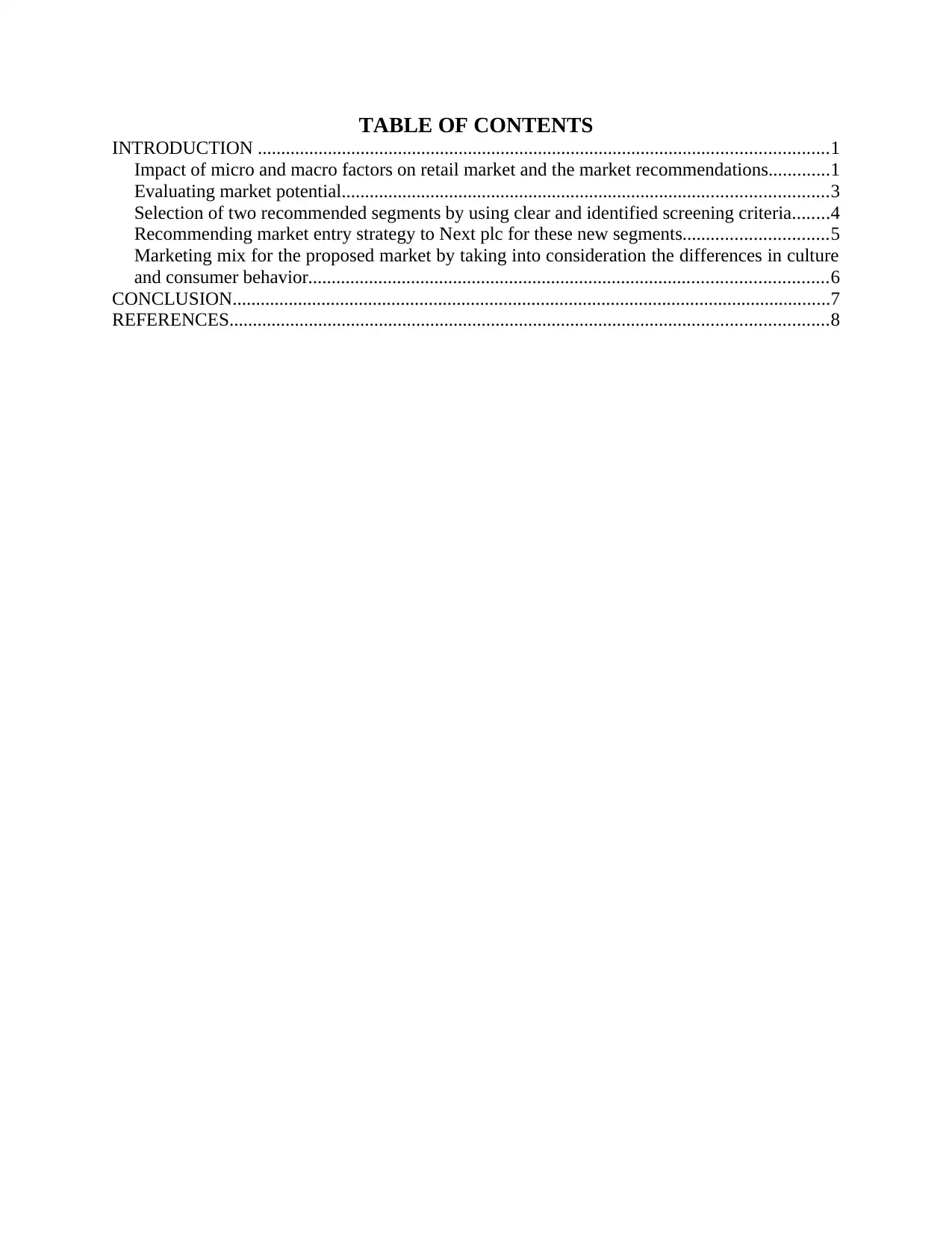
TABLE OF CONTENTS
INTRODUCTION ..........................................................................................................................1
Impact of micro and macro factors on retail market and the market recommendations.............1
Evaluating market potential........................................................................................................3
Selection of two recommended segments by using clear and identified screening criteria........4
Recommending market entry strategy to Next plc for these new segments...............................5
Marketing mix for the proposed market by taking into consideration the differences in culture
and consumer behavior...............................................................................................................6
CONCLUSION................................................................................................................................7
REFERENCES................................................................................................................................8
INTRODUCTION ..........................................................................................................................1
Impact of micro and macro factors on retail market and the market recommendations.............1
Evaluating market potential........................................................................................................3
Selection of two recommended segments by using clear and identified screening criteria........4
Recommending market entry strategy to Next plc for these new segments...............................5
Marketing mix for the proposed market by taking into consideration the differences in culture
and consumer behavior...............................................................................................................6
CONCLUSION................................................................................................................................7
REFERENCES................................................................................................................................8
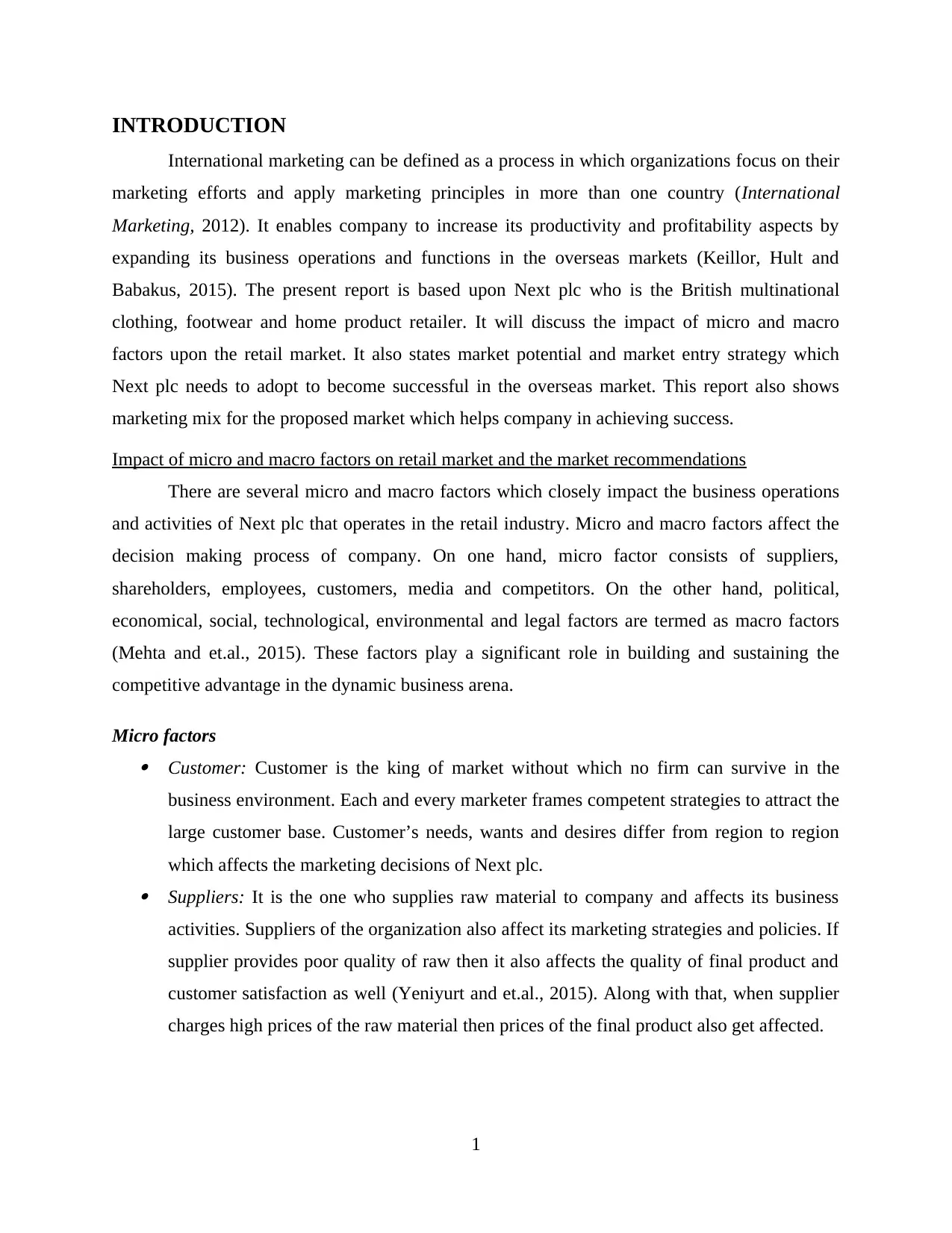
INTRODUCTION
International marketing can be defined as a process in which organizations focus on their
marketing efforts and apply marketing principles in more than one country (International
Marketing, 2012). It enables company to increase its productivity and profitability aspects by
expanding its business operations and functions in the overseas markets (Keillor, Hult and
Babakus, 2015). The present report is based upon Next plc who is the British multinational
clothing, footwear and home product retailer. It will discuss the impact of micro and macro
factors upon the retail market. It also states market potential and market entry strategy which
Next plc needs to adopt to become successful in the overseas market. This report also shows
marketing mix for the proposed market which helps company in achieving success.
Impact of micro and macro factors on retail market and the market recommendations
There are several micro and macro factors which closely impact the business operations
and activities of Next plc that operates in the retail industry. Micro and macro factors affect the
decision making process of company. On one hand, micro factor consists of suppliers,
shareholders, employees, customers, media and competitors. On the other hand, political,
economical, social, technological, environmental and legal factors are termed as macro factors
(Mehta and et.al., 2015). These factors play a significant role in building and sustaining the
competitive advantage in the dynamic business arena.
Micro factors Customer: Customer is the king of market without which no firm can survive in the
business environment. Each and every marketer frames competent strategies to attract the
large customer base. Customer’s needs, wants and desires differ from region to region
which affects the marketing decisions of Next plc. Suppliers: It is the one who supplies raw material to company and affects its business
activities. Suppliers of the organization also affect its marketing strategies and policies. If
supplier provides poor quality of raw then it also affects the quality of final product and
customer satisfaction as well (Yeniyurt and et.al., 2015). Along with that, when supplier
charges high prices of the raw material then prices of the final product also get affected.
1
International marketing can be defined as a process in which organizations focus on their
marketing efforts and apply marketing principles in more than one country (International
Marketing, 2012). It enables company to increase its productivity and profitability aspects by
expanding its business operations and functions in the overseas markets (Keillor, Hult and
Babakus, 2015). The present report is based upon Next plc who is the British multinational
clothing, footwear and home product retailer. It will discuss the impact of micro and macro
factors upon the retail market. It also states market potential and market entry strategy which
Next plc needs to adopt to become successful in the overseas market. This report also shows
marketing mix for the proposed market which helps company in achieving success.
Impact of micro and macro factors on retail market and the market recommendations
There are several micro and macro factors which closely impact the business operations
and activities of Next plc that operates in the retail industry. Micro and macro factors affect the
decision making process of company. On one hand, micro factor consists of suppliers,
shareholders, employees, customers, media and competitors. On the other hand, political,
economical, social, technological, environmental and legal factors are termed as macro factors
(Mehta and et.al., 2015). These factors play a significant role in building and sustaining the
competitive advantage in the dynamic business arena.
Micro factors Customer: Customer is the king of market without which no firm can survive in the
business environment. Each and every marketer frames competent strategies to attract the
large customer base. Customer’s needs, wants and desires differ from region to region
which affects the marketing decisions of Next plc. Suppliers: It is the one who supplies raw material to company and affects its business
activities. Suppliers of the organization also affect its marketing strategies and policies. If
supplier provides poor quality of raw then it also affects the quality of final product and
customer satisfaction as well (Yeniyurt and et.al., 2015). Along with that, when supplier
charges high prices of the raw material then prices of the final product also get affected.
1
⊘ This is a preview!⊘
Do you want full access?
Subscribe today to unlock all pages.

Trusted by 1+ million students worldwide
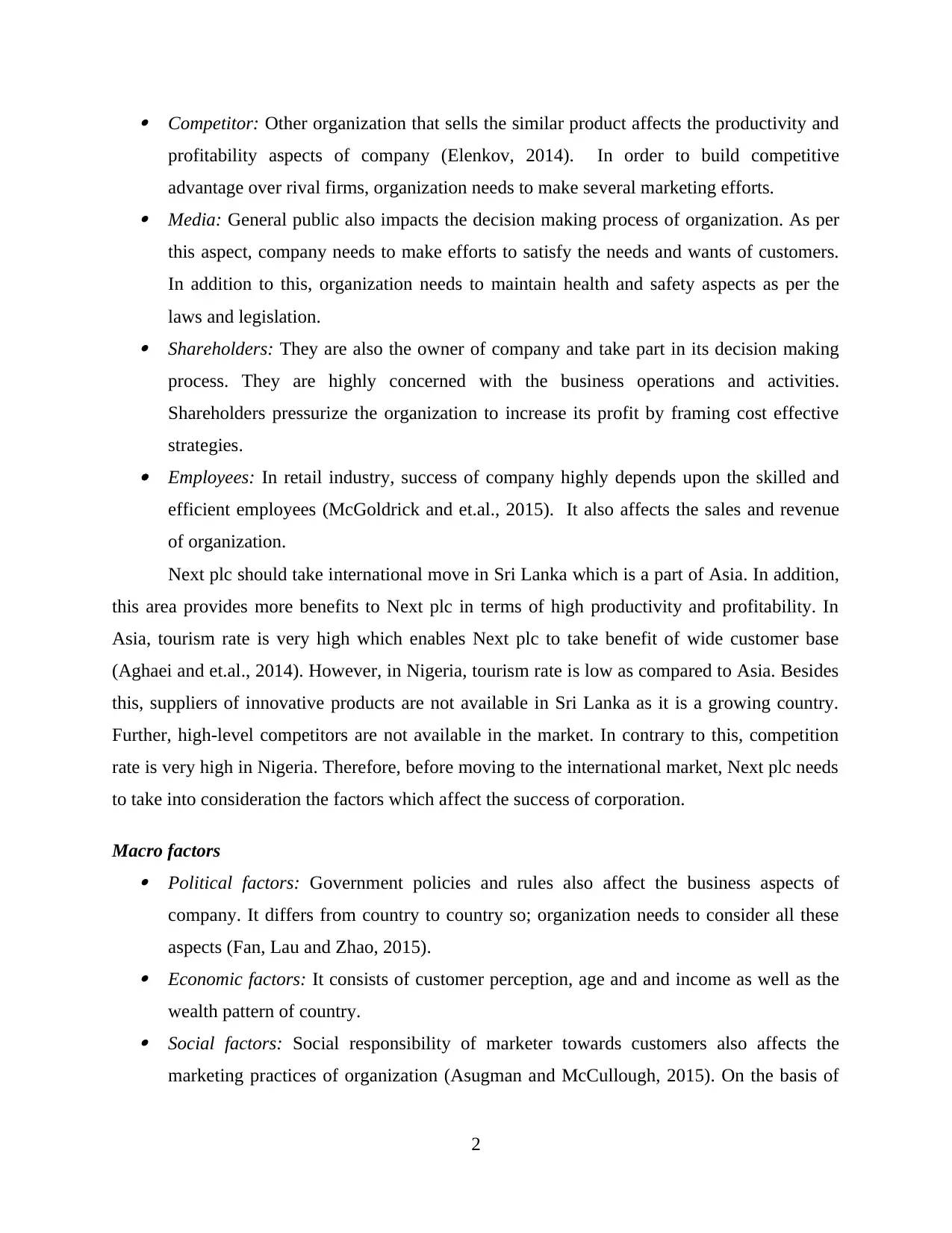
Competitor: Other organization that sells the similar product affects the productivity and
profitability aspects of company (Elenkov, 2014). In order to build competitive
advantage over rival firms, organization needs to make several marketing efforts. Media: General public also impacts the decision making process of organization. As per
this aspect, company needs to make efforts to satisfy the needs and wants of customers.
In addition to this, organization needs to maintain health and safety aspects as per the
laws and legislation. Shareholders: They are also the owner of company and take part in its decision making
process. They are highly concerned with the business operations and activities.
Shareholders pressurize the organization to increase its profit by framing cost effective
strategies. Employees: In retail industry, success of company highly depends upon the skilled and
efficient employees (McGoldrick and et.al., 2015). It also affects the sales and revenue
of organization.
Next plc should take international move in Sri Lanka which is a part of Asia. In addition,
this area provides more benefits to Next plc in terms of high productivity and profitability. In
Asia, tourism rate is very high which enables Next plc to take benefit of wide customer base
(Aghaei and et.al., 2014). However, in Nigeria, tourism rate is low as compared to Asia. Besides
this, suppliers of innovative products are not available in Sri Lanka as it is a growing country.
Further, high-level competitors are not available in the market. In contrary to this, competition
rate is very high in Nigeria. Therefore, before moving to the international market, Next plc needs
to take into consideration the factors which affect the success of corporation.
Macro factors Political factors: Government policies and rules also affect the business aspects of
company. It differs from country to country so; organization needs to consider all these
aspects (Fan, Lau and Zhao, 2015). Economic factors: It consists of customer perception, age and and income as well as the
wealth pattern of country. Social factors: Social responsibility of marketer towards customers also affects the
marketing practices of organization (Asugman and McCullough, 2015). On the basis of
2
profitability aspects of company (Elenkov, 2014). In order to build competitive
advantage over rival firms, organization needs to make several marketing efforts. Media: General public also impacts the decision making process of organization. As per
this aspect, company needs to make efforts to satisfy the needs and wants of customers.
In addition to this, organization needs to maintain health and safety aspects as per the
laws and legislation. Shareholders: They are also the owner of company and take part in its decision making
process. They are highly concerned with the business operations and activities.
Shareholders pressurize the organization to increase its profit by framing cost effective
strategies. Employees: In retail industry, success of company highly depends upon the skilled and
efficient employees (McGoldrick and et.al., 2015). It also affects the sales and revenue
of organization.
Next plc should take international move in Sri Lanka which is a part of Asia. In addition,
this area provides more benefits to Next plc in terms of high productivity and profitability. In
Asia, tourism rate is very high which enables Next plc to take benefit of wide customer base
(Aghaei and et.al., 2014). However, in Nigeria, tourism rate is low as compared to Asia. Besides
this, suppliers of innovative products are not available in Sri Lanka as it is a growing country.
Further, high-level competitors are not available in the market. In contrary to this, competition
rate is very high in Nigeria. Therefore, before moving to the international market, Next plc needs
to take into consideration the factors which affect the success of corporation.
Macro factors Political factors: Government policies and rules also affect the business aspects of
company. It differs from country to country so; organization needs to consider all these
aspects (Fan, Lau and Zhao, 2015). Economic factors: It consists of customer perception, age and and income as well as the
wealth pattern of country. Social factors: Social responsibility of marketer towards customers also affects the
marketing practices of organization (Asugman and McCullough, 2015). On the basis of
2
Paraphrase This Document
Need a fresh take? Get an instant paraphrase of this document with our AI Paraphraser
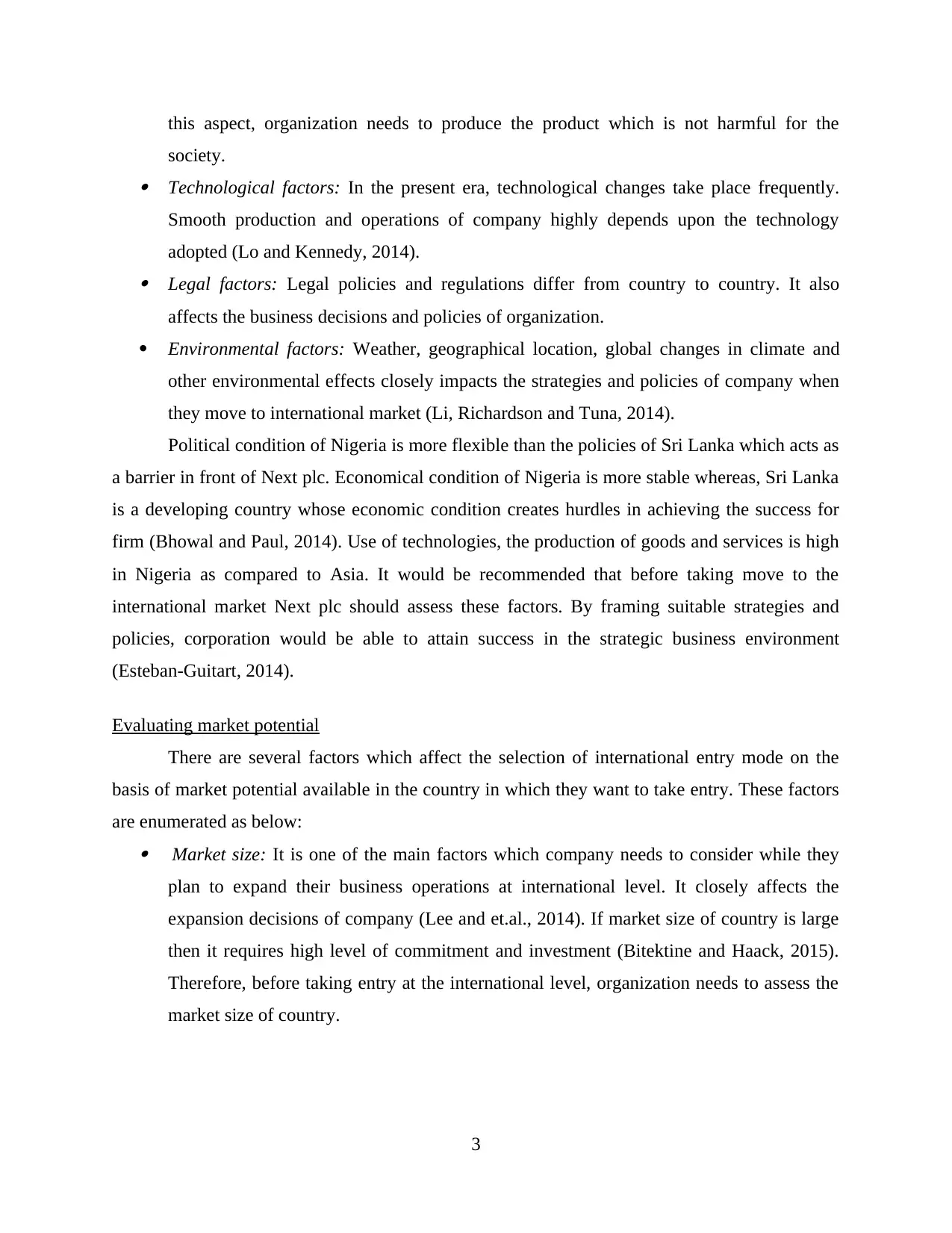
this aspect, organization needs to produce the product which is not harmful for the
society. Technological factors: In the present era, technological changes take place frequently.
Smooth production and operations of company highly depends upon the technology
adopted (Lo and Kennedy, 2014). Legal factors: Legal policies and regulations differ from country to country. It also
affects the business decisions and policies of organization.
Environmental factors: Weather, geographical location, global changes in climate and
other environmental effects closely impacts the strategies and policies of company when
they move to international market (Li, Richardson and Tuna, 2014).
Political condition of Nigeria is more flexible than the policies of Sri Lanka which acts as
a barrier in front of Next plc. Economical condition of Nigeria is more stable whereas, Sri Lanka
is a developing country whose economic condition creates hurdles in achieving the success for
firm (Bhowal and Paul, 2014). Use of technologies, the production of goods and services is high
in Nigeria as compared to Asia. It would be recommended that before taking move to the
international market Next plc should assess these factors. By framing suitable strategies and
policies, corporation would be able to attain success in the strategic business environment
(Esteban-Guitart, 2014).
Evaluating market potential
There are several factors which affect the selection of international entry mode on the
basis of market potential available in the country in which they want to take entry. These factors
are enumerated as below: Market size: It is one of the main factors which company needs to consider while they
plan to expand their business operations at international level. It closely affects the
expansion decisions of company (Lee and et.al., 2014). If market size of country is large
then it requires high level of commitment and investment (Bitektine and Haack, 2015).
Therefore, before taking entry at the international level, organization needs to assess the
market size of country.
3
society. Technological factors: In the present era, technological changes take place frequently.
Smooth production and operations of company highly depends upon the technology
adopted (Lo and Kennedy, 2014). Legal factors: Legal policies and regulations differ from country to country. It also
affects the business decisions and policies of organization.
Environmental factors: Weather, geographical location, global changes in climate and
other environmental effects closely impacts the strategies and policies of company when
they move to international market (Li, Richardson and Tuna, 2014).
Political condition of Nigeria is more flexible than the policies of Sri Lanka which acts as
a barrier in front of Next plc. Economical condition of Nigeria is more stable whereas, Sri Lanka
is a developing country whose economic condition creates hurdles in achieving the success for
firm (Bhowal and Paul, 2014). Use of technologies, the production of goods and services is high
in Nigeria as compared to Asia. It would be recommended that before taking move to the
international market Next plc should assess these factors. By framing suitable strategies and
policies, corporation would be able to attain success in the strategic business environment
(Esteban-Guitart, 2014).
Evaluating market potential
There are several factors which affect the selection of international entry mode on the
basis of market potential available in the country in which they want to take entry. These factors
are enumerated as below: Market size: It is one of the main factors which company needs to consider while they
plan to expand their business operations at international level. It closely affects the
expansion decisions of company (Lee and et.al., 2014). If market size of country is large
then it requires high level of commitment and investment (Bitektine and Haack, 2015).
Therefore, before taking entry at the international level, organization needs to assess the
market size of country.
3
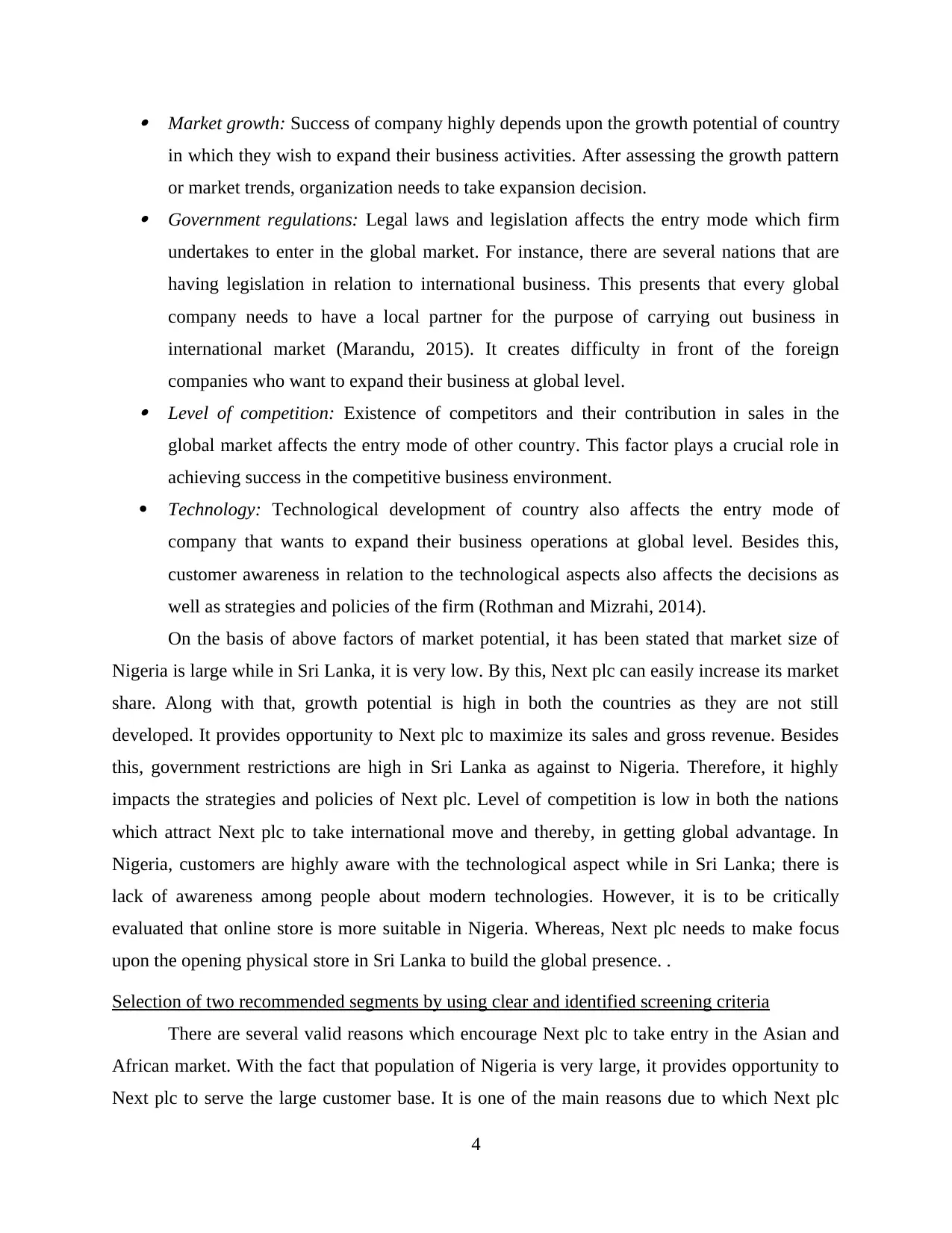
Market growth: Success of company highly depends upon the growth potential of country
in which they wish to expand their business activities. After assessing the growth pattern
or market trends, organization needs to take expansion decision. Government regulations: Legal laws and legislation affects the entry mode which firm
undertakes to enter in the global market. For instance, there are several nations that are
having legislation in relation to international business. This presents that every global
company needs to have a local partner for the purpose of carrying out business in
international market (Marandu, 2015). It creates difficulty in front of the foreign
companies who want to expand their business at global level. Level of competition: Existence of competitors and their contribution in sales in the
global market affects the entry mode of other country. This factor plays a crucial role in
achieving success in the competitive business environment.
Technology: Technological development of country also affects the entry mode of
company that wants to expand their business operations at global level. Besides this,
customer awareness in relation to the technological aspects also affects the decisions as
well as strategies and policies of the firm (Rothman and Mizrahi, 2014).
On the basis of above factors of market potential, it has been stated that market size of
Nigeria is large while in Sri Lanka, it is very low. By this, Next plc can easily increase its market
share. Along with that, growth potential is high in both the countries as they are not still
developed. It provides opportunity to Next plc to maximize its sales and gross revenue. Besides
this, government restrictions are high in Sri Lanka as against to Nigeria. Therefore, it highly
impacts the strategies and policies of Next plc. Level of competition is low in both the nations
which attract Next plc to take international move and thereby, in getting global advantage. In
Nigeria, customers are highly aware with the technological aspect while in Sri Lanka; there is
lack of awareness among people about modern technologies. However, it is to be critically
evaluated that online store is more suitable in Nigeria. Whereas, Next plc needs to make focus
upon the opening physical store in Sri Lanka to build the global presence. .
Selection of two recommended segments by using clear and identified screening criteria
There are several valid reasons which encourage Next plc to take entry in the Asian and
African market. With the fact that population of Nigeria is very large, it provides opportunity to
Next plc to serve the large customer base. It is one of the main reasons due to which Next plc
4
in which they wish to expand their business activities. After assessing the growth pattern
or market trends, organization needs to take expansion decision. Government regulations: Legal laws and legislation affects the entry mode which firm
undertakes to enter in the global market. For instance, there are several nations that are
having legislation in relation to international business. This presents that every global
company needs to have a local partner for the purpose of carrying out business in
international market (Marandu, 2015). It creates difficulty in front of the foreign
companies who want to expand their business at global level. Level of competition: Existence of competitors and their contribution in sales in the
global market affects the entry mode of other country. This factor plays a crucial role in
achieving success in the competitive business environment.
Technology: Technological development of country also affects the entry mode of
company that wants to expand their business operations at global level. Besides this,
customer awareness in relation to the technological aspects also affects the decisions as
well as strategies and policies of the firm (Rothman and Mizrahi, 2014).
On the basis of above factors of market potential, it has been stated that market size of
Nigeria is large while in Sri Lanka, it is very low. By this, Next plc can easily increase its market
share. Along with that, growth potential is high in both the countries as they are not still
developed. It provides opportunity to Next plc to maximize its sales and gross revenue. Besides
this, government restrictions are high in Sri Lanka as against to Nigeria. Therefore, it highly
impacts the strategies and policies of Next plc. Level of competition is low in both the nations
which attract Next plc to take international move and thereby, in getting global advantage. In
Nigeria, customers are highly aware with the technological aspect while in Sri Lanka; there is
lack of awareness among people about modern technologies. However, it is to be critically
evaluated that online store is more suitable in Nigeria. Whereas, Next plc needs to make focus
upon the opening physical store in Sri Lanka to build the global presence. .
Selection of two recommended segments by using clear and identified screening criteria
There are several valid reasons which encourage Next plc to take entry in the Asian and
African market. With the fact that population of Nigeria is very large, it provides opportunity to
Next plc to serve the large customer base. It is one of the main reasons due to which Next plc
4
⊘ This is a preview!⊘
Do you want full access?
Subscribe today to unlock all pages.

Trusted by 1+ million students worldwide
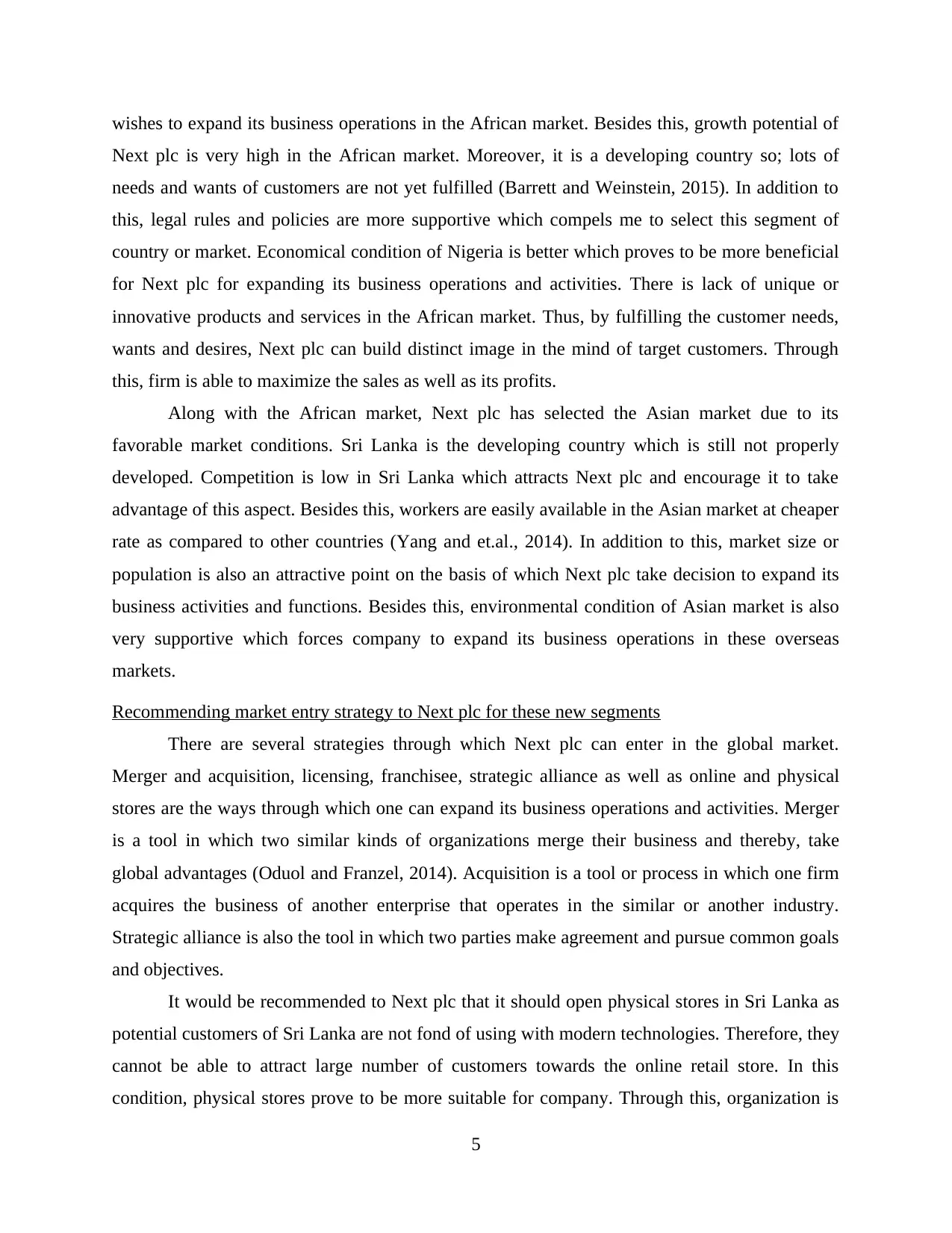
wishes to expand its business operations in the African market. Besides this, growth potential of
Next plc is very high in the African market. Moreover, it is a developing country so; lots of
needs and wants of customers are not yet fulfilled (Barrett and Weinstein, 2015). In addition to
this, legal rules and policies are more supportive which compels me to select this segment of
country or market. Economical condition of Nigeria is better which proves to be more beneficial
for Next plc for expanding its business operations and activities. There is lack of unique or
innovative products and services in the African market. Thus, by fulfilling the customer needs,
wants and desires, Next plc can build distinct image in the mind of target customers. Through
this, firm is able to maximize the sales as well as its profits.
Along with the African market, Next plc has selected the Asian market due to its
favorable market conditions. Sri Lanka is the developing country which is still not properly
developed. Competition is low in Sri Lanka which attracts Next plc and encourage it to take
advantage of this aspect. Besides this, workers are easily available in the Asian market at cheaper
rate as compared to other countries (Yang and et.al., 2014). In addition to this, market size or
population is also an attractive point on the basis of which Next plc take decision to expand its
business activities and functions. Besides this, environmental condition of Asian market is also
very supportive which forces company to expand its business operations in these overseas
markets.
Recommending market entry strategy to Next plc for these new segments
There are several strategies through which Next plc can enter in the global market.
Merger and acquisition, licensing, franchisee, strategic alliance as well as online and physical
stores are the ways through which one can expand its business operations and activities. Merger
is a tool in which two similar kinds of organizations merge their business and thereby, take
global advantages (Oduol and Franzel, 2014). Acquisition is a tool or process in which one firm
acquires the business of another enterprise that operates in the similar or another industry.
Strategic alliance is also the tool in which two parties make agreement and pursue common goals
and objectives.
It would be recommended to Next plc that it should open physical stores in Sri Lanka as
potential customers of Sri Lanka are not fond of using with modern technologies. Therefore, they
cannot be able to attract large number of customers towards the online retail store. In this
condition, physical stores prove to be more suitable for company. Through this, organization is
5
Next plc is very high in the African market. Moreover, it is a developing country so; lots of
needs and wants of customers are not yet fulfilled (Barrett and Weinstein, 2015). In addition to
this, legal rules and policies are more supportive which compels me to select this segment of
country or market. Economical condition of Nigeria is better which proves to be more beneficial
for Next plc for expanding its business operations and activities. There is lack of unique or
innovative products and services in the African market. Thus, by fulfilling the customer needs,
wants and desires, Next plc can build distinct image in the mind of target customers. Through
this, firm is able to maximize the sales as well as its profits.
Along with the African market, Next plc has selected the Asian market due to its
favorable market conditions. Sri Lanka is the developing country which is still not properly
developed. Competition is low in Sri Lanka which attracts Next plc and encourage it to take
advantage of this aspect. Besides this, workers are easily available in the Asian market at cheaper
rate as compared to other countries (Yang and et.al., 2014). In addition to this, market size or
population is also an attractive point on the basis of which Next plc take decision to expand its
business activities and functions. Besides this, environmental condition of Asian market is also
very supportive which forces company to expand its business operations in these overseas
markets.
Recommending market entry strategy to Next plc for these new segments
There are several strategies through which Next plc can enter in the global market.
Merger and acquisition, licensing, franchisee, strategic alliance as well as online and physical
stores are the ways through which one can expand its business operations and activities. Merger
is a tool in which two similar kinds of organizations merge their business and thereby, take
global advantages (Oduol and Franzel, 2014). Acquisition is a tool or process in which one firm
acquires the business of another enterprise that operates in the similar or another industry.
Strategic alliance is also the tool in which two parties make agreement and pursue common goals
and objectives.
It would be recommended to Next plc that it should open physical stores in Sri Lanka as
potential customers of Sri Lanka are not fond of using with modern technologies. Therefore, they
cannot be able to attract large number of customers towards the online retail store. In this
condition, physical stores prove to be more suitable for company. Through this, organization is
5
Paraphrase This Document
Need a fresh take? Get an instant paraphrase of this document with our AI Paraphraser
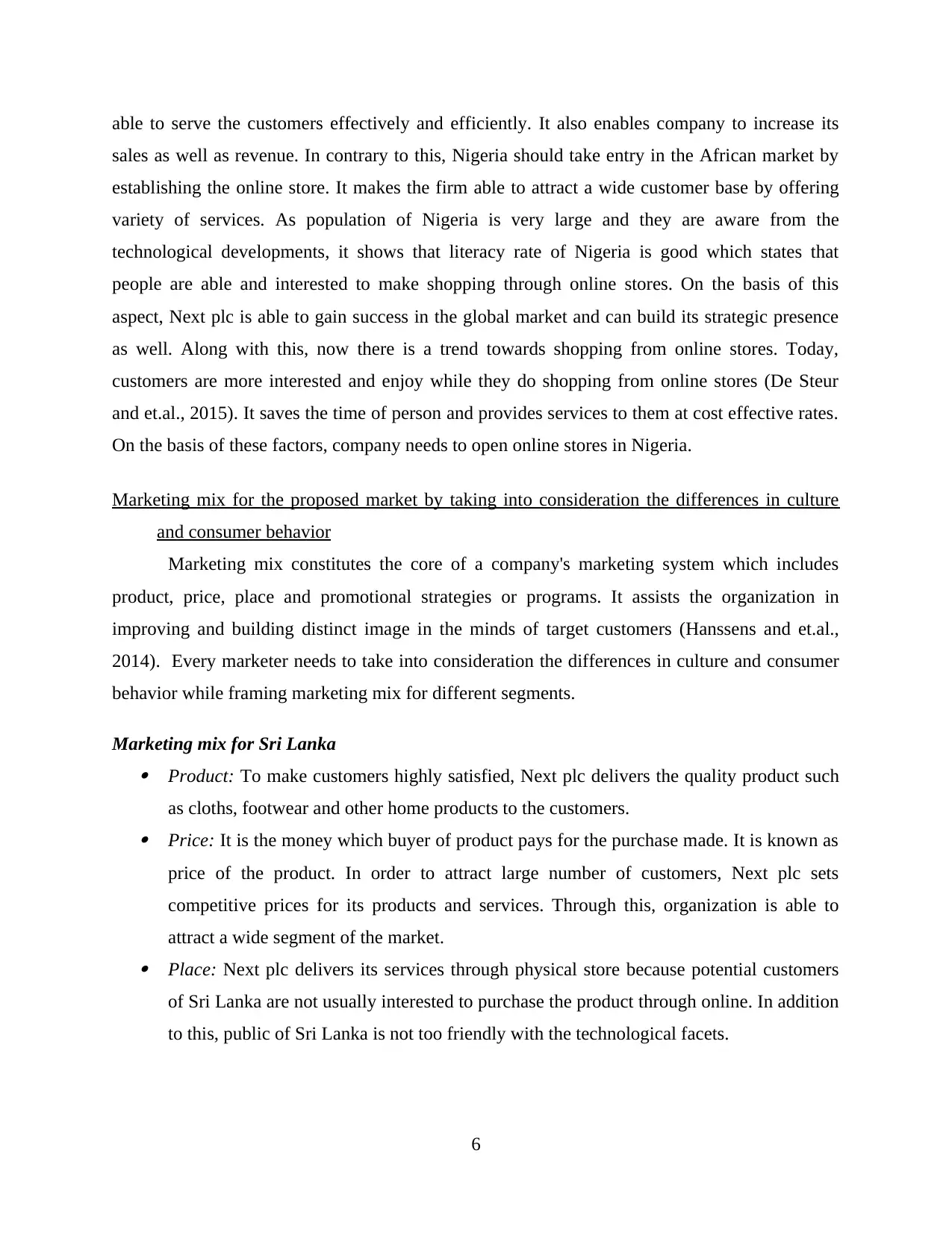
able to serve the customers effectively and efficiently. It also enables company to increase its
sales as well as revenue. In contrary to this, Nigeria should take entry in the African market by
establishing the online store. It makes the firm able to attract a wide customer base by offering
variety of services. As population of Nigeria is very large and they are aware from the
technological developments, it shows that literacy rate of Nigeria is good which states that
people are able and interested to make shopping through online stores. On the basis of this
aspect, Next plc is able to gain success in the global market and can build its strategic presence
as well. Along with this, now there is a trend towards shopping from online stores. Today,
customers are more interested and enjoy while they do shopping from online stores (De Steur
and et.al., 2015). It saves the time of person and provides services to them at cost effective rates.
On the basis of these factors, company needs to open online stores in Nigeria.
Marketing mix for the proposed market by taking into consideration the differences in culture
and consumer behavior
Marketing mix constitutes the core of a company's marketing system which includes
product, price, place and promotional strategies or programs. It assists the organization in
improving and building distinct image in the minds of target customers (Hanssens and et.al.,
2014). Every marketer needs to take into consideration the differences in culture and consumer
behavior while framing marketing mix for different segments.
Marketing mix for Sri Lanka Product: To make customers highly satisfied, Next plc delivers the quality product such
as cloths, footwear and other home products to the customers. Price: It is the money which buyer of product pays for the purchase made. It is known as
price of the product. In order to attract large number of customers, Next plc sets
competitive prices for its products and services. Through this, organization is able to
attract a wide segment of the market. Place: Next plc delivers its services through physical store because potential customers
of Sri Lanka are not usually interested to purchase the product through online. In addition
to this, public of Sri Lanka is not too friendly with the technological facets.
6
sales as well as revenue. In contrary to this, Nigeria should take entry in the African market by
establishing the online store. It makes the firm able to attract a wide customer base by offering
variety of services. As population of Nigeria is very large and they are aware from the
technological developments, it shows that literacy rate of Nigeria is good which states that
people are able and interested to make shopping through online stores. On the basis of this
aspect, Next plc is able to gain success in the global market and can build its strategic presence
as well. Along with this, now there is a trend towards shopping from online stores. Today,
customers are more interested and enjoy while they do shopping from online stores (De Steur
and et.al., 2015). It saves the time of person and provides services to them at cost effective rates.
On the basis of these factors, company needs to open online stores in Nigeria.
Marketing mix for the proposed market by taking into consideration the differences in culture
and consumer behavior
Marketing mix constitutes the core of a company's marketing system which includes
product, price, place and promotional strategies or programs. It assists the organization in
improving and building distinct image in the minds of target customers (Hanssens and et.al.,
2014). Every marketer needs to take into consideration the differences in culture and consumer
behavior while framing marketing mix for different segments.
Marketing mix for Sri Lanka Product: To make customers highly satisfied, Next plc delivers the quality product such
as cloths, footwear and other home products to the customers. Price: It is the money which buyer of product pays for the purchase made. It is known as
price of the product. In order to attract large number of customers, Next plc sets
competitive prices for its products and services. Through this, organization is able to
attract a wide segment of the market. Place: Next plc delivers its services through physical store because potential customers
of Sri Lanka are not usually interested to purchase the product through online. In addition
to this, public of Sri Lanka is not too friendly with the technological facets.
6
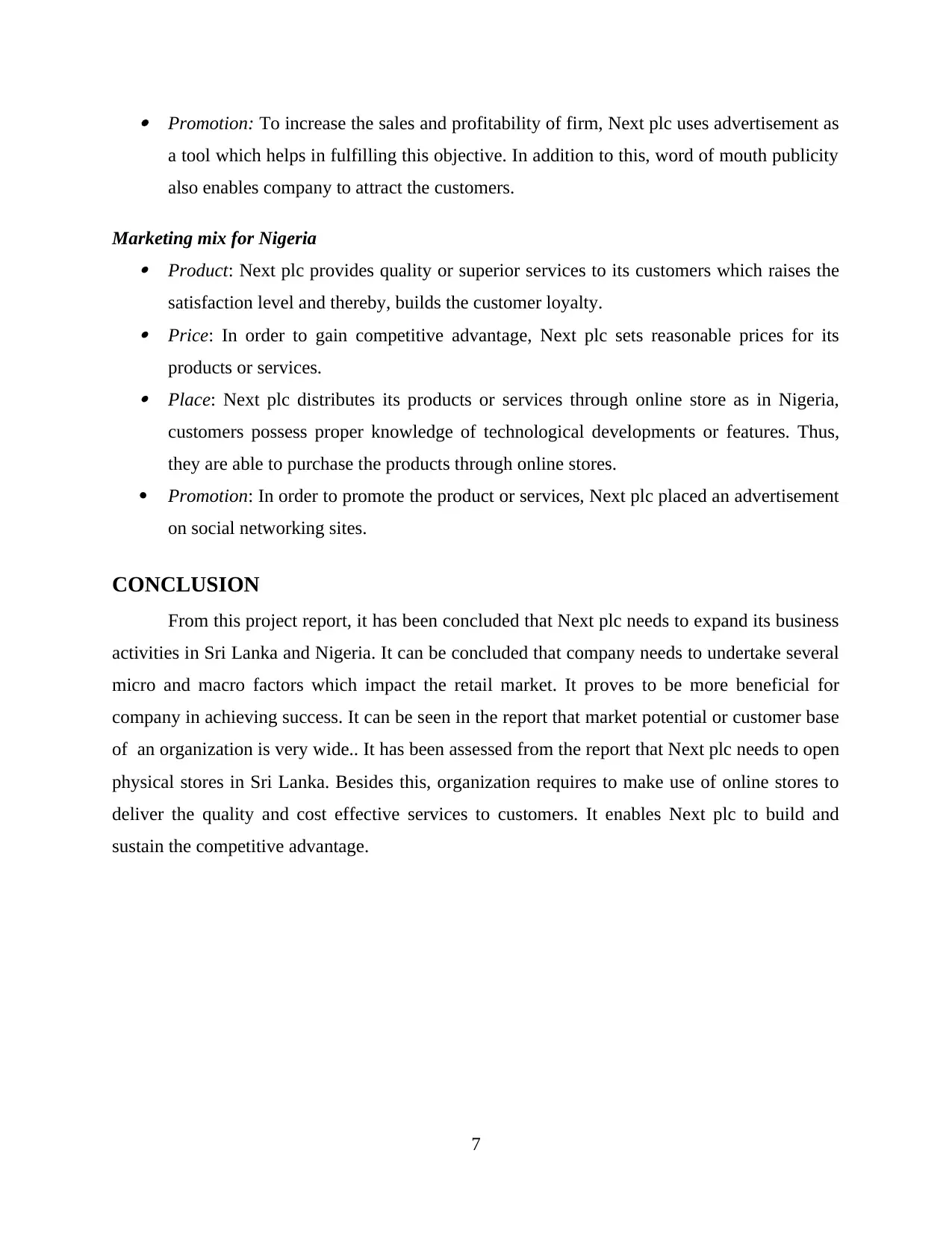
Promotion: To increase the sales and profitability of firm, Next plc uses advertisement as
a tool which helps in fulfilling this objective. In addition to this, word of mouth publicity
also enables company to attract the customers.
Marketing mix for Nigeria Product: Next plc provides quality or superior services to its customers which raises the
satisfaction level and thereby, builds the customer loyalty. Price: In order to gain competitive advantage, Next plc sets reasonable prices for its
products or services. Place: Next plc distributes its products or services through online store as in Nigeria,
customers possess proper knowledge of technological developments or features. Thus,
they are able to purchase the products through online stores.
Promotion: In order to promote the product or services, Next plc placed an advertisement
on social networking sites.
CONCLUSION
From this project report, it has been concluded that Next plc needs to expand its business
activities in Sri Lanka and Nigeria. It can be concluded that company needs to undertake several
micro and macro factors which impact the retail market. It proves to be more beneficial for
company in achieving success. It can be seen in the report that market potential or customer base
of an organization is very wide.. It has been assessed from the report that Next plc needs to open
physical stores in Sri Lanka. Besides this, organization requires to make use of online stores to
deliver the quality and cost effective services to customers. It enables Next plc to build and
sustain the competitive advantage.
7
a tool which helps in fulfilling this objective. In addition to this, word of mouth publicity
also enables company to attract the customers.
Marketing mix for Nigeria Product: Next plc provides quality or superior services to its customers which raises the
satisfaction level and thereby, builds the customer loyalty. Price: In order to gain competitive advantage, Next plc sets reasonable prices for its
products or services. Place: Next plc distributes its products or services through online store as in Nigeria,
customers possess proper knowledge of technological developments or features. Thus,
they are able to purchase the products through online stores.
Promotion: In order to promote the product or services, Next plc placed an advertisement
on social networking sites.
CONCLUSION
From this project report, it has been concluded that Next plc needs to expand its business
activities in Sri Lanka and Nigeria. It can be concluded that company needs to undertake several
micro and macro factors which impact the retail market. It proves to be more beneficial for
company in achieving success. It can be seen in the report that market potential or customer base
of an organization is very wide.. It has been assessed from the report that Next plc needs to open
physical stores in Sri Lanka. Besides this, organization requires to make use of online stores to
deliver the quality and cost effective services to customers. It enables Next plc to build and
sustain the competitive advantage.
7
⊘ This is a preview!⊘
Do you want full access?
Subscribe today to unlock all pages.

Trusted by 1+ million students worldwide
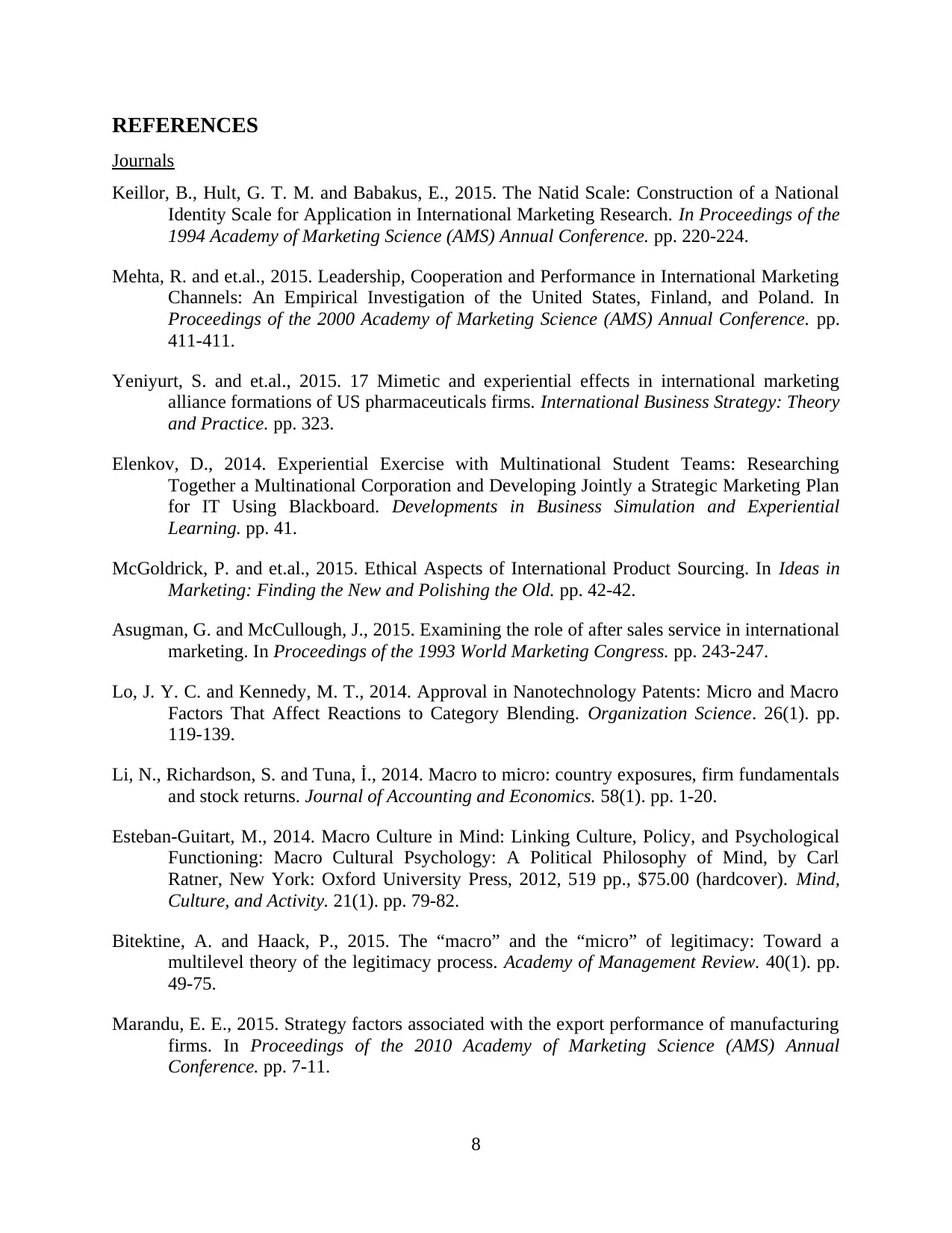
REFERENCES
Journals
Keillor, B., Hult, G. T. M. and Babakus, E., 2015. The Natid Scale: Construction of a National
Identity Scale for Application in International Marketing Research. In Proceedings of the
1994 Academy of Marketing Science (AMS) Annual Conference. pp. 220-224.
Mehta, R. and et.al., 2015. Leadership, Cooperation and Performance in International Marketing
Channels: An Empirical Investigation of the United States, Finland, and Poland. In
Proceedings of the 2000 Academy of Marketing Science (AMS) Annual Conference. pp.
411-411.
Yeniyurt, S. and et.al., 2015. 17 Mimetic and experiential effects in international marketing
alliance formations of US pharmaceuticals firms. International Business Strategy: Theory
and Practice. pp. 323.
Elenkov, D., 2014. Experiential Exercise with Multinational Student Teams: Researching
Together a Multinational Corporation and Developing Jointly a Strategic Marketing Plan
for IT Using Blackboard. Developments in Business Simulation and Experiential
Learning. pp. 41.
McGoldrick, P. and et.al., 2015. Ethical Aspects of International Product Sourcing. In Ideas in
Marketing: Finding the New and Polishing the Old. pp. 42-42.
Asugman, G. and McCullough, J., 2015. Examining the role of after sales service in international
marketing. In Proceedings of the 1993 World Marketing Congress. pp. 243-247.
Lo, J. Y. C. and Kennedy, M. T., 2014. Approval in Nanotechnology Patents: Micro and Macro
Factors That Affect Reactions to Category Blending. Organization Science. 26(1). pp.
119-139.
Li, N., Richardson, S. and Tuna, İ., 2014. Macro to micro: country exposures, firm fundamentals
and stock returns. Journal of Accounting and Economics. 58(1). pp. 1-20.
Esteban-Guitart, M., 2014. Macro Culture in Mind: Linking Culture, Policy, and Psychological
Functioning: Macro Cultural Psychology: A Political Philosophy of Mind, by Carl
Ratner, New York: Oxford University Press, 2012, 519 pp., $75.00 (hardcover). Mind,
Culture, and Activity. 21(1). pp. 79-82.
Bitektine, A. and Haack, P., 2015. The “macro” and the “micro” of legitimacy: Toward a
multilevel theory of the legitimacy process. Academy of Management Review. 40(1). pp.
49-75.
Marandu, E. E., 2015. Strategy factors associated with the export performance of manufacturing
firms. In Proceedings of the 2010 Academy of Marketing Science (AMS) Annual
Conference. pp. 7-11.
8
Journals
Keillor, B., Hult, G. T. M. and Babakus, E., 2015. The Natid Scale: Construction of a National
Identity Scale for Application in International Marketing Research. In Proceedings of the
1994 Academy of Marketing Science (AMS) Annual Conference. pp. 220-224.
Mehta, R. and et.al., 2015. Leadership, Cooperation and Performance in International Marketing
Channels: An Empirical Investigation of the United States, Finland, and Poland. In
Proceedings of the 2000 Academy of Marketing Science (AMS) Annual Conference. pp.
411-411.
Yeniyurt, S. and et.al., 2015. 17 Mimetic and experiential effects in international marketing
alliance formations of US pharmaceuticals firms. International Business Strategy: Theory
and Practice. pp. 323.
Elenkov, D., 2014. Experiential Exercise with Multinational Student Teams: Researching
Together a Multinational Corporation and Developing Jointly a Strategic Marketing Plan
for IT Using Blackboard. Developments in Business Simulation and Experiential
Learning. pp. 41.
McGoldrick, P. and et.al., 2015. Ethical Aspects of International Product Sourcing. In Ideas in
Marketing: Finding the New and Polishing the Old. pp. 42-42.
Asugman, G. and McCullough, J., 2015. Examining the role of after sales service in international
marketing. In Proceedings of the 1993 World Marketing Congress. pp. 243-247.
Lo, J. Y. C. and Kennedy, M. T., 2014. Approval in Nanotechnology Patents: Micro and Macro
Factors That Affect Reactions to Category Blending. Organization Science. 26(1). pp.
119-139.
Li, N., Richardson, S. and Tuna, İ., 2014. Macro to micro: country exposures, firm fundamentals
and stock returns. Journal of Accounting and Economics. 58(1). pp. 1-20.
Esteban-Guitart, M., 2014. Macro Culture in Mind: Linking Culture, Policy, and Psychological
Functioning: Macro Cultural Psychology: A Political Philosophy of Mind, by Carl
Ratner, New York: Oxford University Press, 2012, 519 pp., $75.00 (hardcover). Mind,
Culture, and Activity. 21(1). pp. 79-82.
Bitektine, A. and Haack, P., 2015. The “macro” and the “micro” of legitimacy: Toward a
multilevel theory of the legitimacy process. Academy of Management Review. 40(1). pp.
49-75.
Marandu, E. E., 2015. Strategy factors associated with the export performance of manufacturing
firms. In Proceedings of the 2010 Academy of Marketing Science (AMS) Annual
Conference. pp. 7-11.
8
Paraphrase This Document
Need a fresh take? Get an instant paraphrase of this document with our AI Paraphraser
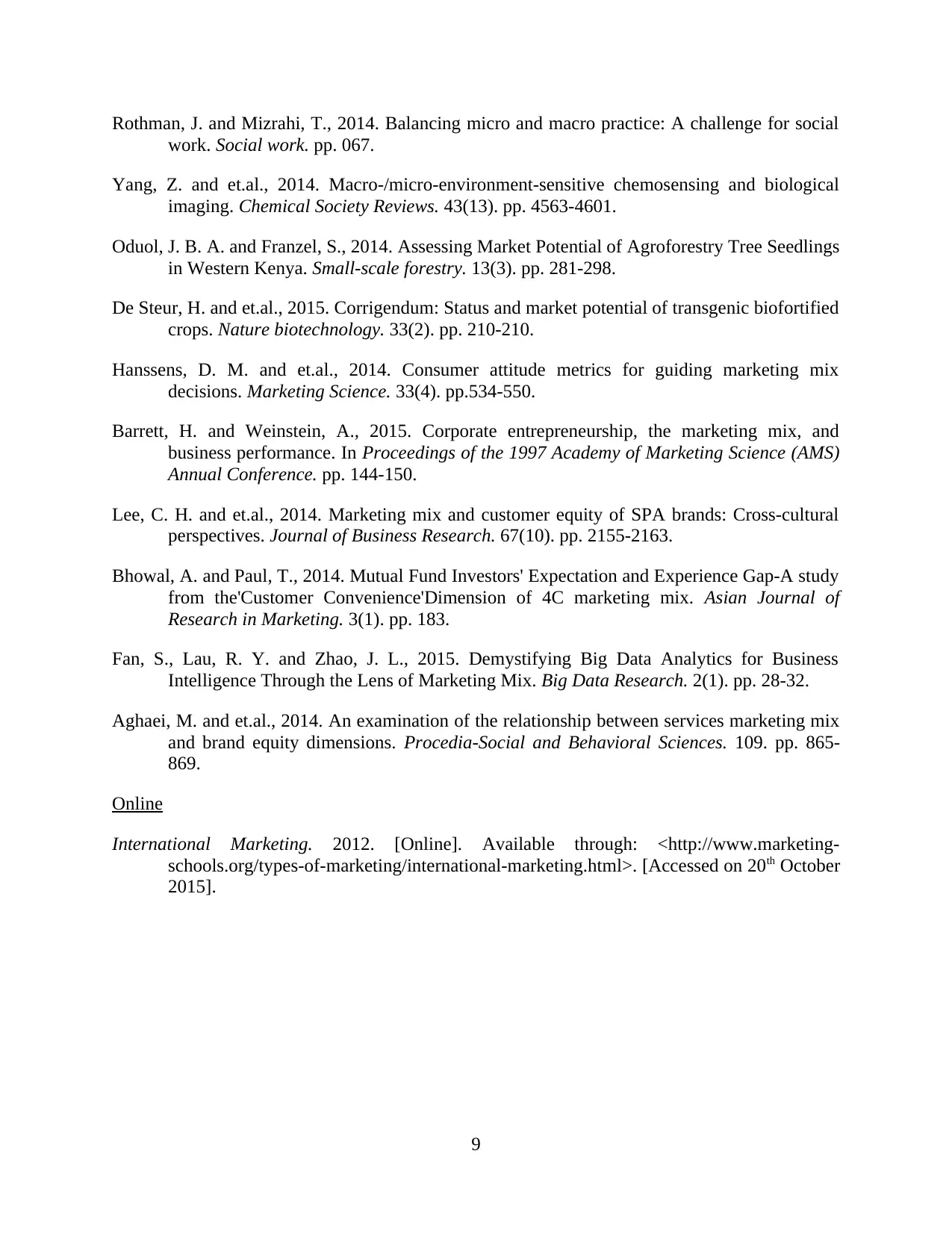
Rothman, J. and Mizrahi, T., 2014. Balancing micro and macro practice: A challenge for social
work. Social work. pp. 067.
Yang, Z. and et.al., 2014. Macro-/micro-environment-sensitive chemosensing and biological
imaging. Chemical Society Reviews. 43(13). pp. 4563-4601.
Oduol, J. B. A. and Franzel, S., 2014. Assessing Market Potential of Agroforestry Tree Seedlings
in Western Kenya. Small-scale forestry. 13(3). pp. 281-298.
De Steur, H. and et.al., 2015. Corrigendum: Status and market potential of transgenic biofortified
crops. Nature biotechnology. 33(2). pp. 210-210.
Hanssens, D. M. and et.al., 2014. Consumer attitude metrics for guiding marketing mix
decisions. Marketing Science. 33(4). pp.534-550.
Barrett, H. and Weinstein, A., 2015. Corporate entrepreneurship, the marketing mix, and
business performance. In Proceedings of the 1997 Academy of Marketing Science (AMS)
Annual Conference. pp. 144-150.
Lee, C. H. and et.al., 2014. Marketing mix and customer equity of SPA brands: Cross-cultural
perspectives. Journal of Business Research. 67(10). pp. 2155-2163.
Bhowal, A. and Paul, T., 2014. Mutual Fund Investors' Expectation and Experience Gap-A study
from the'Customer Convenience'Dimension of 4C marketing mix. Asian Journal of
Research in Marketing. 3(1). pp. 183.
Fan, S., Lau, R. Y. and Zhao, J. L., 2015. Demystifying Big Data Analytics for Business
Intelligence Through the Lens of Marketing Mix. Big Data Research. 2(1). pp. 28-32.
Aghaei, M. and et.al., 2014. An examination of the relationship between services marketing mix
and brand equity dimensions. Procedia-Social and Behavioral Sciences. 109. pp. 865-
869.
Online
International Marketing. 2012. [Online]. Available through: <http://www.marketing-
schools.org/types-of-marketing/international-marketing.html>. [Accessed on 20th October
2015].
9
work. Social work. pp. 067.
Yang, Z. and et.al., 2014. Macro-/micro-environment-sensitive chemosensing and biological
imaging. Chemical Society Reviews. 43(13). pp. 4563-4601.
Oduol, J. B. A. and Franzel, S., 2014. Assessing Market Potential of Agroforestry Tree Seedlings
in Western Kenya. Small-scale forestry. 13(3). pp. 281-298.
De Steur, H. and et.al., 2015. Corrigendum: Status and market potential of transgenic biofortified
crops. Nature biotechnology. 33(2). pp. 210-210.
Hanssens, D. M. and et.al., 2014. Consumer attitude metrics for guiding marketing mix
decisions. Marketing Science. 33(4). pp.534-550.
Barrett, H. and Weinstein, A., 2015. Corporate entrepreneurship, the marketing mix, and
business performance. In Proceedings of the 1997 Academy of Marketing Science (AMS)
Annual Conference. pp. 144-150.
Lee, C. H. and et.al., 2014. Marketing mix and customer equity of SPA brands: Cross-cultural
perspectives. Journal of Business Research. 67(10). pp. 2155-2163.
Bhowal, A. and Paul, T., 2014. Mutual Fund Investors' Expectation and Experience Gap-A study
from the'Customer Convenience'Dimension of 4C marketing mix. Asian Journal of
Research in Marketing. 3(1). pp. 183.
Fan, S., Lau, R. Y. and Zhao, J. L., 2015. Demystifying Big Data Analytics for Business
Intelligence Through the Lens of Marketing Mix. Big Data Research. 2(1). pp. 28-32.
Aghaei, M. and et.al., 2014. An examination of the relationship between services marketing mix
and brand equity dimensions. Procedia-Social and Behavioral Sciences. 109. pp. 865-
869.
Online
International Marketing. 2012. [Online]. Available through: <http://www.marketing-
schools.org/types-of-marketing/international-marketing.html>. [Accessed on 20th October
2015].
9
1 out of 11
Related Documents
Your All-in-One AI-Powered Toolkit for Academic Success.
+13062052269
info@desklib.com
Available 24*7 on WhatsApp / Email
![[object Object]](/_next/static/media/star-bottom.7253800d.svg)
Unlock your academic potential
Copyright © 2020–2025 A2Z Services. All Rights Reserved. Developed and managed by ZUCOL.




